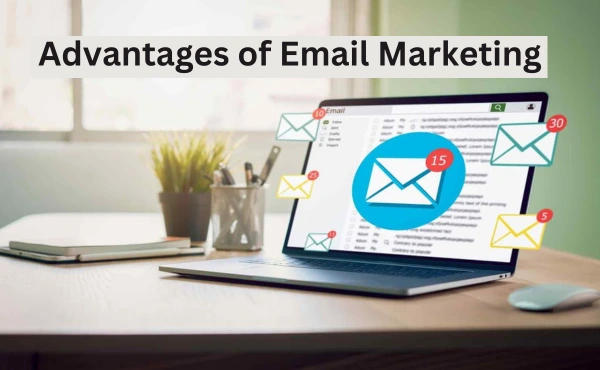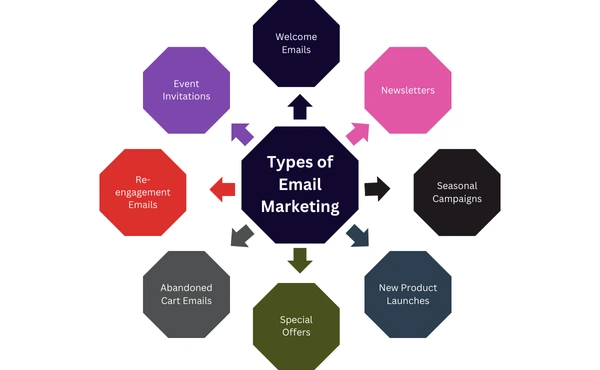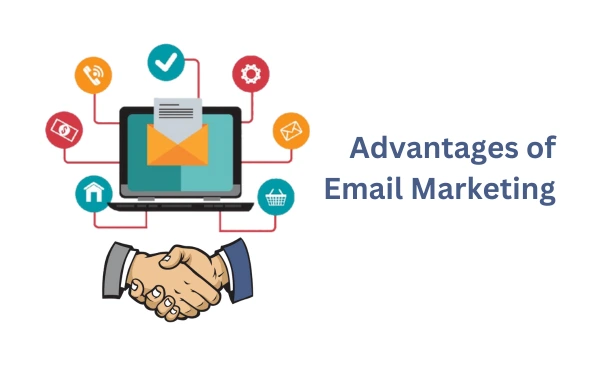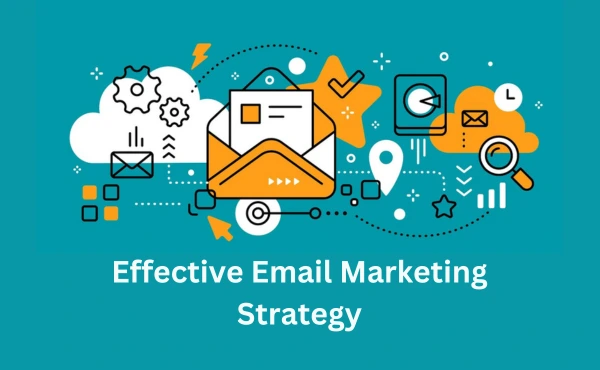Yes, Boost Inbox is designed to cater to businesses of all sizes and industries.

- What is Email Marketing?
- Why Email Marketing is Important?
- Types of Email Marketing
- Advantages of Email Marketing
- High ROI
- Generates Traffic to Your Website
- Strengthens Relationships with Customers
- Increases Brand Awareness
- Create Personalized Content
- Cost-Effective
- Get Immediate Results
- Find More Quality Leads
- Increase Engagement on Social Media
- Own Your Contact Lists
- Better Communication
- Promote New Products or Services
- Automate Messages
- Builds Credibility
- Gather Feedback
- Flexible Design
- Personalization and Segmentation
- Time-Saving
- Real-Time Marketing
- A Step-by-Step Guide for an Effective Email Marketing Strategy
- Conclusion
- FAQs
- 1. What are the biggest email marketing advantages and disadvantages?
- 2. How to create successful email marketing campaigns?
- 3. What are the best tools to create email campaigns?
- 4. How does Email Marketing Help Businesses?
- 5. Why Email Marketing is Important for Business
- 6. What Are the Benefits of Email Marketing for Companies?
- 7. What Are the Advantages of Email Marketing in Digital Marketing?
- 8. What Are the Benefits of Newsletter Marketing?
Email marketing is a smart and effective approach for businesses to reach customers in the digital world. It has been around for many years and continues to function well for both small and large businesses. Businesses use email to share updates, issue offers, and communicate with their customers directly.
It allows them to stay engaged, attract more attention, and grow more quickly. In this post, we will discuss what is email marketing, why email marketing is so important, the various types of emails you may send, the advantages of email marketing services, and some ideas for making your email campaigns effective for your business.
What is Email Marketing?
Email marketing is a powerful digital marketing strategy that helps businesses communicate directly with their audience via email. Unlike social media, which uses algorithms to determine what you see, email marketing allows businesses to send messages directly to their email subscribers people who have an interest in the business by signing up for its email list.
Companies can use tools such as email automation and segmentation to create and send personalized marketing campaigns. Email automation helps businesses create workflows that send messages at the right times without manual effort. Email segmentation helps organizations classify their subscribers depending on their preferences, ensuring that the proper message reaches the correct person.
This allows businesses to engage with their audiences in real-time communication, develop consumer relationships, and achieve objectives such as increased sales or client loyalty. Additionally, email warmup service can help improve the effectiveness of email campaigns by improving deliverability rates. Overall, email marketing is a direct communication medium that connects businesses to their customers.
Why Email Marketing is Important?
Email marketing is important because it allows businesses to stay engaged with their clients in ways that other channels, such as social media or sponsored ads, cannot always equal. One of the most important reasons email marketing is so effective is its high marketing ROI. Businesses can earn $42 for every $1 spent, making it an extremely cost-effective advertising strategy.
Businesses can improve customer engagement by using well-crafted emails and automated workflows to keep their audience interested and engaged. Email marketing also helps build brand loyalty by delivering welcome emails, follow-ups, and special offers to customers, showing that they are valued.
Unlike social media, where algorithms control visibility, businesses fully own their email lists. This allows businesses more control over communication and improves customer retention. It's also an excellent lead generation tool, allowing businesses to expand and develop their business growth strategies. Additionally, email marketing complements social media integration, allowing firms to reach clients across numerous channels.
Types of Email Marketing

Email marketing provides a variety of email types to meet the demands of different businesses. These emails allow organizations to communicate with customers in a variety of ways, depending on the purpose. Using tools available in productivity suites like Microsoft 365, you can create various types of email marketing campaigns.
Welcome Emails
First impressions are important, and welcome emails are an excellent opportunity to introduce your business to new subscribers. They set the tone for a great customer relationship management (CRM) experience by greeting customers and explaining what they may expect. A well-crafted welcome email increases customer satisfaction and starts the partnership on a positive note.
Newsletters
Newsletter marketing is a wonderful approach to keep your target audience up to date on product updates, specials, and industry news. You can reuse email templates to ensure consistent communication with subscribers. Newsletters are important for content marketing success, as they keep your audience engaged and passionate about your company.
Seasonal Campaigns
Seasonal campaigns are perfect for communicating with customers during holidays and special occasions. These seasonal emails usually include discount incentives, which increase sales and make your business look more relevant. They also work well for event promotion, pushing people to take advantage of limited-time deals.
New Product Launches
When you have new items or services to announce, promotional email campaigns are an excellent method to build interest. You can send sneak peek offers and use engaging marketing assets like visuals to capture attention and lead sales.
Special Offers
Sending exclusive offers via email generates a sense of urgency. Urgent updates, such as flash sales or limited-time deals, can motivate your customers to act quickly. Businesses can use targeted email lists to ensure that those who need it receive the right offers at the right time.
Abandoned Cart Emails
Customers sometimes leave products in their carts without making a purchase. Abandoned cart emails are transactional emails that remind customers about their purchases, encouraging them to complete the purchase and reducing shopping cart abandonment.
Re-engagement Emails
Re-engagement campaigns can help get inactive subscribers back. Offering value is a great way to nurture customer relationships after a period of inactivity. Post-transaction communication also helps maintain these relationships.
Event Invitations
Event promotion via email helps you to invite customers to special events such as webinars and product launches. Viral marketing is often boosted by sending time-sensitive offers to encourage immediate attendance and participation, increasing your brand's visibility.
Advantages of Email Marketing

Email marketing offers a high ROI, is cost-effective, and measurable, and helps businesses of all sizes build relationships, lead sales, and meet industry benchmarks with ease using email software. One of the key advantages of email advertising is understanding the best time for sending cold emails to improve campaign performance.
High ROI
Email marketing stands out because it provides a higher ROI (Return on Investment) than other digital marketing strategies. Businesses of all sizes, from startups to large corporations, like it since it is both affordable and effective. On average, email marketing returns $42 for every $1 spent, making it an excellent choice for increasing income.
The benefits of using email marketing software allow organizations to track performance and exceed industry benchmarks, ensuring that each campaign is optimized for success. Because of its low cost and results, email marketing is a top tool for increasing sales, creating relationships, and producing results that truly make a difference.
Generates Traffic to Your Website
Email marketing is an effective way to drive traffic to your website. By using traffic generation strategies, such as including links in your promotional emails, you can encourage readers to click and explore your site. This is a key part of inbound marketing, where the goal is to attract customers to your business naturally.
Whether it’s a blog post, product page, or special offer, emails can guide your audience to take action. This not only boosts your website traffic but also helps with digital branding, ensuring your business stays top-of-mind while increasing chances of sales and conversions.
Strengthens Relationships with Customers
Email marketing helps businesses connect better with their customers through relationship marketing. By sending personalized messages and updates that match their interests, you show customers that they matter. Regular communication fosters trust, which is key to building long-term loyalty.
Emails are also a great way to gather insights through customer feedback surveys, helping businesses understand what customers need and how to improve. This strengthens the bond between the brand and its audience. Over time, thoughtful and consistent emails build credibility, making customers more likely to stay loyal and recommend your business to others.
Increases Brand Awareness
Email marketing is a great way to boost brand awareness. By sending consistent and well-designed emails, your business stays visible and memorable to your audience. Using modern marketing tools, you can create professional emails that reflect your brand’s style and message.
Email segmentation helps businesses deliver personalized content to the right audience, increasing engagement and effectiveness. Over time, this consistent communication helps people recognize and trust your brand, making it their go-to choice. Whether it’s updates, promotions, or tips, regular emails keep your business top-of-mind and strengthen your connection with customers.
Create Personalized Content
Email marketing makes it easy to connect with customers through personalized email campaigns. By using behavior-based segmentation, businesses can group customers based on their actions, preferences, or interests. This helps in creating personalized messages that feel relevant and engaging. For example, you can send product recommendations, exclusive offers, or updates that match what a customer likes or needs.
This personalized strategy not only captures attention but also gradually encourages trust and loyalty over time. With the right content delivered to the right people, businesses can boost engagement and make every customer feel valued and understood.
Cost-Effective
Email marketing is one of the most budget-friendly ways to promote your business. Using affordable marketing tools and a bulk email service, businesses can send messages to thousands of people at a low cost. Unlike traditional advertising, the cost per contact with email marketing is very small, making it an ideal choice for businesses with limited budgets.
Even with its affordability, email campaigns deliver impressive results, such as increased sales and customer engagement. This combination of low investment and high returns makes email marketing a smart and efficient way to reach your audience and grow your business.
Get Immediate Results
One of the biggest advantages of using email marketing is that it delivers results quickly. Businesses can track subscriber behavior almost immediately after sending a campaign. Metrics like good email open rates show how many people opened the email, while click-through rates reveal how many clicked on links within the email.
This instant feedback helps businesses understand what works and what doesn’t, allowing them to improve future campaigns. By analyzing these results, businesses can make real-time adjustments to better meet their goals. The immediate and measurable response makes email marketing an effective tool for engaging customers and creating success.
Find More Quality Leads
Email marketing helps businesses find better leads through permission-based marketing. This means the people who sign up for your emails are already interested in what you offer. With tools like demographic targeting, you can focus on the target audience most likely to need your products or services.
Once you have their attention, email campaigns make lead nurturing easy by providing useful information, special offers, or updates. This builds trust and moves potential customers closer to making a purchase. By reaching the right people and keeping them engaged, email marketing turns quality leads into loyal customers.
Increase Engagement on Social Media
Email marketing can help boost your social media presence. By including links to your social media accounts in your emails, you encourage subscribers to follow and interact with your business across platforms. This integration can help your business overcome social media algorithms that limit the reach of posts, allowing you to connect directly with your audience.
Sharing exclusive content or promotions through email also increases your viral marketing potential, as subscribers may share your posts. Plus, engagement analytics from both email and social media help you understand what your audience enjoys, making it easier to improve and grow your engagement on all platforms.
Own Your Contact Lists
One of the key advantage mail marketing is that you own your contact lists. Unlike rented lists or platforms that control what you see, email lists are assets you manage directly. This means you have full data ownership and control over who receives your messages.
With proper email list management, you can keep your audience up-to-date, personalize communication, and build strong relationships. Email list ownership ensures that you’re not dependent on third-party platforms or algorithms to reach your audience, giving you more power to connect with your customers whenever you choose.
Better Communication
Email marketing provides real-time customer engagement, allowing businesses to communicate directly with their audience. Unlike social media, where posts can get lost in a sea of content, emails ensure that your message reaches the intended person without distractions. This leads to more focused and effective communication.
Additionally, email marketing is time-saving, as businesses can schedule messages in advance, ensuring timely delivery. It’s also an environmentally-friendly marketing option, as it reduces the need for paper and print materials. Overall, emails offer a more personal, clear, and direct way to connect with customers, enhancing the communication experience.
Promote New Products or Services
Email marketing is a great way to promote new products or services directly to your audience. By sending targeted direct marketing emails, businesses can create excitement and drive initial sales. Through email content optimization, you can design messages that highlight the benefits of e marketing and features of your new offerings in a way that draws attention.
Additionally, email campaign optimization ensures that your messages reach the right people at the right time. By creating well-timed and engaging email campaigns, businesses can Create awareness and interest, leading to more customers discovering and purchasing new products.
Automate Messages
Automating your email messages is a great way to save time and increase efficiency. With automated email workflows, businesses can set up emails to be sent automatically at the right time, without needing to send each one manually. For example, drip email campaigns automatically send a series of messages over time to nurture leads and keep customers engaged.
This kind of workflow automation ensures that subscribers receive timely, relevant messages based on their behavior or interests. By automating emails, Businesses can provide customized content, stay connected with their audience, and focus on other important tasks.
Builds Credibility
Regularly sending emails helps your brand appear reliable and professional, which builds trust with your audience. By ensuring better communication through well-created emails, you keep customers informed and engaged. Email design optimization plays a key role in this, as attractive and easy-to-read emails make a strong, positive impression.
As customers see your brand in their inbox consistently, they start to feel more confident in your business. Tools like the Net Promoter Score (NPS) can help you measure customer satisfaction, ensuring your emails are improving your brand’s credibility. Over time, this leads to stronger relationships and increased trust.
Gather Feedback
Email marketing is a great way to collect feedback from your customers. By sending customer feedback surveys through email, businesses can gather important information about customer preferences and satisfaction. This helps understand what customers like or dislike, allowing you to improve your products or services.
Tracking open rate analysis shows how many people opened the survey emails, while bounced email tracking helps ensure that your emails are reaching the right audience. Collecting this feedback via email helps businesses to make data-driven decisions and continually improve customer experience and engagement.
Flexible Design
With modern email marketing software, businesses can easily create visually appealing emails thanks to flexible email design tools. Drag-and-drop editors make it simple for anyone to build an attractive email without needing design skills. You can move and adjust elements like images, text, and buttons with ease.
Many platforms also offer pre-designed templates to get started quickly, allowing businesses to customize emails that suit their brand style. This flexibility helps create professional-looking emails that capture attention, leading to better engagement and higher chances of success in marketing campaigns.
Personalization and Segmentation
Email marketing allows businesses to send personalized messages by dividing their email lists into segments. Segmented lists help marketers send targeted content based on factors like customer age, location, or past purchases. Purchase history tracking lets businesses understand what customers have bought and send relevant offers or recommendations.
This approach makes emails more relevant, increasing the chances of customers taking action. By analyzing email performance metrics, like open rates and click-through rates, businesses can fine-tune their strategies and improve future campaigns. Personalization and segmentation help build stronger relationships with customers, making them feel valued and understood.
Time-Saving
Email marketing saves businesses a lot of time through email automation. With automated workflows, emails are sent automatically at the right time, without needing to do everything manually. This is especially helpful for small business marketing, as it allows business owners to focus on other important tasks.
Additionally, pre-designed templates make it quick and easy to create professional emails without starting from scratch. Email marketing can also support multichannel integration, meaning you can connect your emails with other platforms like social media to reach your audience more effectively. Overall, email marketing simplifies campaign management, saving time and effort.
Real-Time Marketing
Email marketing lets businesses stay relevant by responding quickly to trends or urgent updates. With email forwarding, businesses can easily share important information with customers right away. This helps to keep your audience informed about new products, sales, or news as it happens.
Immediate interactions through email also allow businesses to address customer needs quickly, creating a stronger connection. By analyzing campaign metrics, such as open rates and click-through rates, businesses can see how their emails perform in real time, making it easier to adjust and stay on top of changing trends or customer interests.
A Step-by-Step Guide for an Effective Email Marketing Strategy

A step-by-step guide for an effective email marketing strategy helps businesses build a quality email list, create compelling content, personalize messages, and optimize campaigns for better results.
Step 1: Build a Quality Email List
The first step in creating a successful email marketing strategy is to focus on email list building. You can use methods like sign-up forms, offering valuable gated content, or promoting events to attract people who are genuinely interested in your brand. It's important to follow legal email marketing practices to ensure you're collecting and using email addresses responsibly. A high-quality subscriber list means you are reaching the right people, increasing the chances of successful campaigns.
Step 2: Create Compelling Content
Next, focus on crafting personalized messages that resonate with your audience. This includes creating targeted email lists to make sure you're sending relevant content. Include effective CTAs (Call to Action) that guide your subscribers toward taking action, whether it’s making a purchase or learning more. To make sure your emails perform well, use A/B testing for emails to experiment with different subject lines, content, and designs to find what works best.
Step 3: Segment and Personalize
In this step, you'll want to use behavior-based segmentation and demographic targeting to divide your audience into groups based on interests, behaviors, or location. This helps in creating custom workflows for each segment, ensuring that each subscriber gets content that is relevant to them.
Step 4: Monitor and Optimize Campaigns
Finally, track your email performance using marketing metrics such as open rates, click-through rates, and sales conversion rates. Use campaign tracking tools to analyze how your emails are performing and conduct A/B testing for emails to optimize future campaigns and improve results.
Conclusion
Email marketing is an effective tool for businesses seeking to expand and prosper. It includes high ROI, which means firms can get a lot of value for their money. This makes it a cost-effective approach to reach customers and increase revenue. Customer engagement is another key benefits of email campaigns allowing businesses to connect directly with their audience. Businesses that send specific emails can keep customers interested and develop long-term relationships.
Email segmentation is also important since it allows communications to be targeted to different groups and so become more relevant. Overall, email marketing helps organizations boost traffic, raise brand awareness, and meet marketing objectives, making it a must-have approach for expansion. By summarizing benefits, businesses can see that email marketing is a smart, efficient way to increase sales and stay connected with customers. If you want to learn about email marketing guidelines, check out our blog Email Marketing Guidelines.
FAQs

1. What are the biggest email marketing advantages and disadvantages?
Advantages: Email marketing is cost-effective, highly targeted, and delivers a high ROI. It enables automation, personalization, and measurable results, boosting engagement and conversions.
Disadvantages: Spam filters, low open rates, unsubscribes, and competition can reduce effectiveness. Poor targeting may lead to lost credibility.
2. How to create successful email marketing campaigns?
To create successful campaigns, start with a high-quality email list and use pre-designed templates to generate strong, personalized content. Marketing scalability is also important, so keep track of your results and change as needed.
3. What are the best tools to create email campaigns?
Mailchimp, Constant Contact, and HubSpot are some of the most user-friendly platforms for email marketing solutions. These email marketing software options offer tools for automation, segmentation, and thorough analytics to help optimize campaigns.
4. How does Email Marketing Help Businesses?
Email marketing helps businesses by providing a direct and cost-effective way to engage customers, promote products, and drive conversions. It enables personalized communication, builds customer relationships, and increases brand awareness.
5. Why Email Marketing is Important for Business
Email marketing is important for businesses because it enhances customer retention, drives sales, and nurtures leads. It provides direct access to customers, making it an effective way to promote offers, provide updates, and strengthen brand loyalty.
6. What Are the Benefits of Email Marketing for Companies?
The key benefit of email marketing include higher engagement, better customer retention, and increased revenue. For better outcomes, businesses can segment audiences, monitor performance indicators, and improve their marketing strategies.
7. What Are the Advantages of Email Marketing in Digital Marketing?
Email marketing in digital marketing is cost-effective, highly targeted, and delivers a high ROI. It makes audience segmentation, automation, and personalized communication easier. It is an important tool for consumer engagement and growth because it allows businesses to track open rates, clicks, and conversions with measurable results.
8. What Are the Benefits of Newsletter Marketing?
Newsletter marketing boosts website traffic, promotes brand loyalty, and improves customer engagement. It builds leads, promotes goods and services, and allows customized communication. With measurable results and automation, newsletters help businesses maintain regular contact and increase conversions.
What to read next
Absolutely! Boost Inbox is compatible with most major email service providers.
The warmup process duration may vary depending on your email volume, but it typically ranges from a few days to a couple of weeks.
Yes, Boost Inbox offers dedicated customer support to assist you throughout the warmup process.
While it's possible, it's best to start the warmup process from the beginning with Boost Inbox for optimal results.
.webp)
.webp)